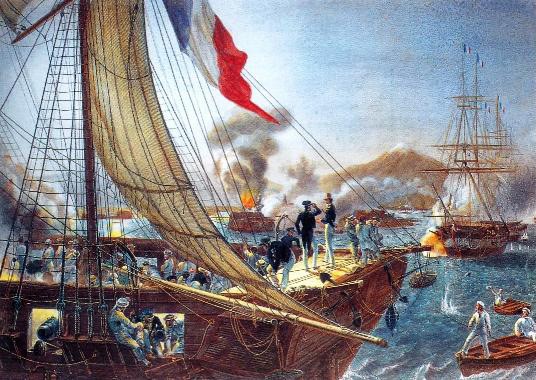
It is common to use the expression know when you don't know the answer; this means a simple “I don't know” or “who knows” in Mexican slang. These types of expressions are still used to this day, however, the origin of many of them is not known, since over time words were added to complete popular phrases.
The origin of this expression dates back to the Second Mexican Empire, the name of the State ruled by Maximilian of Habsburg. After the Reform War, which brought devastating consequences for the Mexican nation, there was an economic crisis that caused the president Benito Juárez suspended the payment of debts to other countries.
This generated a negative reaction to England, Spain and France, so on October 31, 1861 England, France and Spain signed an agreement in London to occupy the military fortresses of the Mexican coast and thus obtain customs resources and collect the debt of the three countries.
Thus, on March 5, 1862, the French troops arrived in Veracruz, and only a month later they were preparing to advance to Mexico City, on May 4 they arrived in Amozoc, province of Puebla, where the famous battle of May 5 takes place.

On June 21, the Second Mexican Empire was proclaimed political and ruled by Maximilian who accepted the crown on October 3. During the following months, clashes continued between French and Republican troops, which ended in 1867 as the Mexican army took more power and the French lost it.
Well, the French, unable to communicate with Mexicans due to the language barrier, responded to everything with “Je ne sais pas”, which means “I don't know” in French; over time it was cut to “sais pas” that Mexicans heard it as “know” and this expression was related to not knowing “something”. Which was normalized until today with the same meaning.
Over time it was mixed with other words such as the expression “know the ball” which dates back to the Mexican Revolution. “La bola” was a group of people, united mainly to go against Porfirio Díaz, who were credited with robberies, fires, predation. The term came about in the 19th century.
They were the unrecognized ones of the revolutionary movement: poor people, peasants, women who decided to follow the soldiers and sustain the daily life of struggle, but that history doesn't touch much.

Mariano Azuela was one of the first novelists to address the Mexican Revolution, some of his works contain this term as in the classic book entitled Los de abajo where he describes exactly what they were like.
One part of the text reads: “Look my general, if as it seems, this ball will continue, if the revolution is not over, we already have enough to go and shine it for a season outside the country.”
When there was looting or destruction and it was not known who to blame, people said it was this group. That's why “know the ball” means that the answer is a third party. It is also used in the expression “go to the ball”, which refers to the people who joined the Revolution.
KEEP READING:
Últimas Noticias
Debanhi Escobar: they secured the motel where she was found lifeless in a cistern
Members of the Specialized Prosecutor's Office in Nuevo León secured the Nueva Castilla Motel as part of the investigations into the case

The oldest person in the world died at the age of 119
Kane Tanaka lived in Japan. She was born six months earlier than George Orwell, the same year that the Wright brothers first flew, and Marie Curie became the first woman to win a Nobel Prize

Macabre find in CDMX: they left a body bagged and tied in a taxi
The body was left in the back seats of the car. It was covered with black bags and tied with industrial tape
The eagles of America will face Manchester City in a duel of legends. Here are the details
The top Mexican football champion will play a match with Pep Guardiola's squad in the Lone Star Cup

Why is it good to bring dogs out to know the world when they are puppies
A so-called protection against the spread of diseases threatens the integral development of dogs




